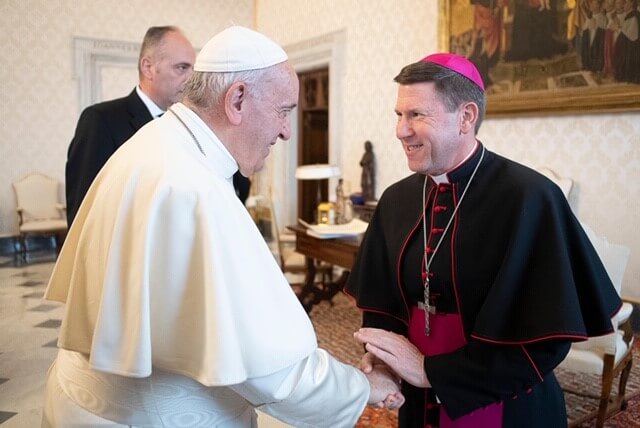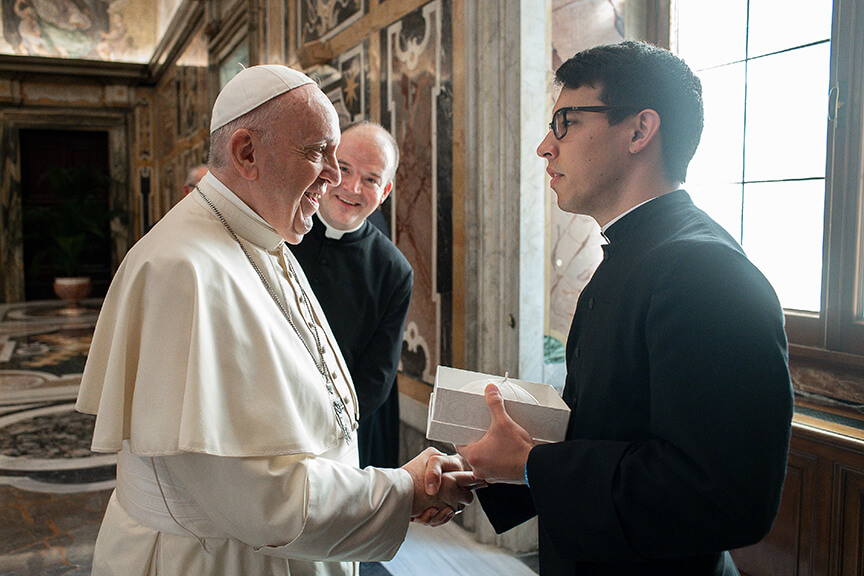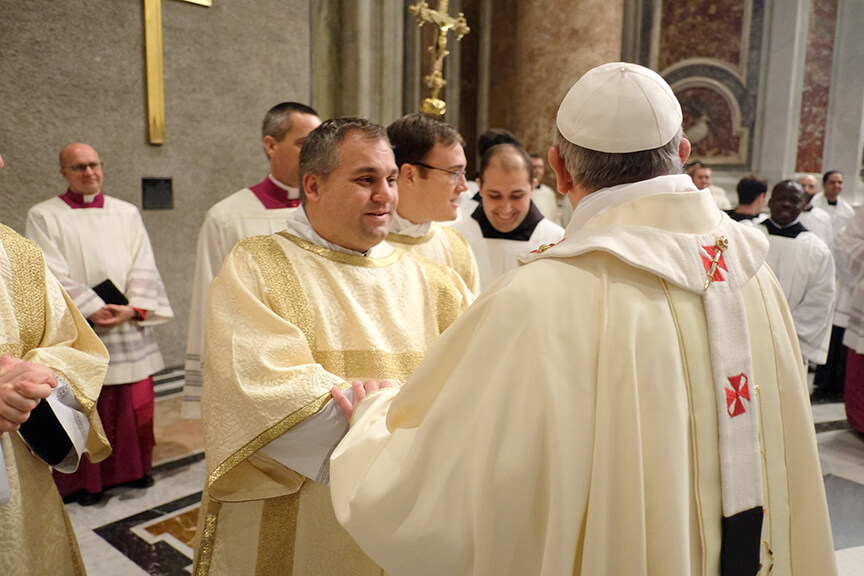
It’s been 10 years since Cardinal Jorge Mario Bergoglio of the Society of Jesus, from the edge of the earth in Latin America, stepped out onto the balcony overlooking St. Peter’s Square as Pope Francis on March 13, 2013.
And from the moment he did, he established his humility, mercy, and love.
“The thing I remember very vividly in that moment was his request that we pray for him right when he was elected,” said Father Mark Beckman, pastor of St. Henry Church. “I was so moved by that, and I immediately began to pray.
“I was watching it on TV, and, to me, it seemed the silence in St. Peter’s Square was palpable even over the television broadcast,” continued Father Beckman, who at the time was pastor of St. Matthew Church in Franklin.
Father Eric Fowlkes, pastor of the Cathedral of the Incarnation, said he was also moved by the occasion, and the final choice that was made.
“The sense of the magnitude of the occasion but also the choice of someone from Latin America, I felt very moved by all that,” said Father Fowlkes, who was pastor of Our Lady of the Lake Church in Hendersonville at the time. “I knew a bit about him because I had traveled in Argentina, and I knew he had a reputation of being close and near to the people and a very pastoral leader.
“The way he introduced himself, in the midst of all the solemnity, to say, ‘Buona Sera,’ (Italian for “Good Evening”), was so down to earth,” he said. “There was that immediate feeling of connectedness to the people.”
Witnessing the moment in person
Father Phillip Halladay, pastor of St. Luke Church in Smyrna, was a seminarian at the Pontifical North American College in Rome, when Pope Francis was elected. He and his fellow seminarians were in St. Peter’s Square with thousands of others when the white smoke appeared amidst the dark of the night sky.
“It was surreal,” Father Halladay said. “It’s one of those top five things to be able to do in your lifetime, to be in Rome at a conclave during the election of a pope.”
“It was also uplifting and encouraging to realize how much the Church does mean to the world and that the entire world was fixated on it,” he continued. “I think that proves the importance of God and that representative of God and Jesus Christ on the earth.”
Father Andy Bulso, pastor of St. Edward Church, was also a seminarian studying in Rome at the time.
“It wasn’t like anything I had been through before,” Father Bulso said in a previous interview with the Tennessee Register.
“Bells started ringing throughout the city. People started filtering into the Piazza of St. Peter’s in anticipation of the pope coming out on the balcony,” Father Bulso recalled. “It was raining and there was this sea of umbrellas. Luckily it stopped raining when he came out on the balcony so you could see him.
“The most significant moment was when Pope Francis stepped out on the balcony,” Father Bulso said. “Not many people knew who he was. We heard his name Bergoglio and thought he was an Italian. … But it didn’t matter. People around the world had their shepherd.
“The excitement and the release in a way was palpable,” Father Bulso added. “There was a lot of joy of having a shepherd again.”
Studying as a seminarian under Pope Francis
Father Halladay said that after Pope Francis was elected, he didn’t waste any time.
“Pope Francis didn’t let grass grow under his feet,” Father Halladay said. “He immediately wanted to come to the North American College after we were ordained deacons (in October 2013) to visit with all of us.
“Then, shortly after that, because the Vatican leans on the deacons in Rome when they do liturgies, I was able to serve with Pope Francis just after my diaconate ordination for the Feast of the Holy Family” in December 2013. “I just always thought it was very much a gift for me to be there.
“To be there with the vicar of Christ, to serve with Pope Francis at the altar right when he was getting to his pontificate and moving the Church in great directions of placing us in an openness truly towards the world in a way of bringing unity and peace and harmony to the whole Christian world was something I will never forget,” Father Halladay concluded. “He’s almost like an awesome grandparent in the sense of his approach to things. … He wants people to be together even though we may have disagreements, or we may see things different theologically. He wants the Church to be a sense of home and community where everyone has a spot in it.”

Diocese of Nashville seminarian David Lee, who is studying at the North American College, said it has been “a gift to live in Rome” as he described the three times he’s been able to encounter the Holy Father.
“It has been an experience that has certainly strengthened my love for the pope. It has led to several meetings with Pope Francis,” Lee said. “Within two weeks of arriving in Rome in September 2020, I had the opportunity to meet Pope Francis for the first time with the rest of my classmates after two weeks in quarantine. He spoke about the importance of prayer and study, but also reminded us to remember to make time for recreation, especially playing sports. I will always remember his smile and the time that he took to meet each of us individually and shake our hands.”
In March 2022, “I was able to serve Easter Sunday for the Pope,” Lee said. “It was a powerful experience to pray with the man who is leading the Church on earth. To be only feet away from the Pope as he placed incense in the thurible that I was holding was a moment I will never forget.”
The third encounter was in October 2022 with his fellow seminarians.
“It was a moment in which it felt like a father was speaking to thousands of his spiritual sons. On this occasion, his reflection on ‘equilibrium’ and ‘harmony’ was particularly impactful. He spoke of how, oftentimes in life, we seek the illusion of comfort in a perfectly balanced life in which we think we have everything under control,” Lee continued. “Yet, the nature of the Christian life is one that is constantly imbalanced, because God constantly challenges us to grow. A life of true conversion is uncomfortable, but it is in this discomfort that we encounter the work of the Holy Spirit.
“Personally, for me these words were powerful because it gave me the freedom to realize that I don’t have to always feel like I have life perfectly figured out,” he said. “It is God who is in control and gives us the grace to be in relationship with Him.”
“Each of these moments of encounter has helped me to see the humanity of Pope Francis,” Lee concluded. “It is often easy for me to see him as a celebrity type figure, but meeting him in person has helped me to see that he too is human just as I am and is walking the same earthly pilgrimage to God as we all are.”
Pope Francis, the pastor
These views of Pope Francis as a pastoral leader first and foremost have only been emphasized over his last 10 years in the chair of St. Peter.
From washing the feet of prisoners during his first Holy Thursday to his landmark encyclical “Laudato Si’: On the Care for Our Common Home” to his approach of love and mercy above all else, his message has always remained consistent.
“Pope Francis is a faithful reflection of Jesus who is always reaching out to people who are suffering and the marginalized and the poor, the sick and sinners,” Father Beckman said. “His pastoral approach to things has been one of the great strengths of Pope Francis, and I think he is calling the Church, and he has specifically mentioned the priests of the Church, to be attentive listeners to God’s people and to walk with them and to accompany them, especially families and persons going through difficulties.
“For me, that has always been an important part of priests, an important part of the mission of the Church, so I appreciate the fact that Pope Francis is underlining that call,” he said. “I’ve heard from a lot of people even beyond the Catholic Church talking about what an inspiration Pope Francis has been to them personally, and as I respond to people pastorally, I am conscious of the time that Pope Francis has encouraged us to do that, so it is a source of inspiration to me in that regard.”
Father Fowlkes said Pope Francis’ pastoral way of leading has been “central to his whole ministry.”
“We have seen that pastoral approach of love and compassion consistently throughout these last 10 years, particularly that desire to go to the peripheries, the people on the margins, and to be outwardly directed in the faith,” Father Fowlkes said. “There is a great missionary emphasis and his apostolic exhortation, ‘The Joy of the Gospel,’ was indicative of everything that he has tried to embrace these last 10 years.
“It, in many ways, has affirmed what is my life, which is to be a pastor to the people and to be an example of hope, encouragement, and always the reminder of God’s love and mercy,” he added.
Always say ‘Yes’ to the Pope
In reflecting on the Holy Father’s 10-year anniversary, Bishop J. Mark Spalding recalled the call that changed the course of his pastoral life when the Apostolic Nuncio of the United States of America, on behalf of the Holy Father, asked him to serve as the 12th bishop of Nashville.
“In that call, the Apostolic Nuncio does make it clear that he is speaking in the name of the pope when he asks you to consider being a bishop,” Bishop Spalding said.
“The response I gave, after pausing for a moment was, ‘I will serve with the gifts that God has given me,’” Bishop Spalding recalled. “When the pope asks you to do something in the Church, inspired by the Holy Spirit, I believe that we should say, ‘Yes.’”
“On the evening before my ordination and installation, we had evening prayer, and I preached (about the Pope’s pastoral leadership) in my homily,” recalled Bishop Spalding, who was ordained and installed on Feb. 2, 2018. “I spoke about Pope Francis’ emphasis on mercy, mission, and margins, and I believe he has been consistent with those three areas throughout his pontificate.”
This wasn’t the first appointment that Bishop Spalding received from the Holy Father.
During the Jubilee Year of Mercy in 2016, Bishop Spalding was one of priests from around the world chosen by Pope Francis to be a Missionary of Mercy. During Lent that year, every diocese was to have one of these missionaries available to forgive sins, even those reserved to the Holy See’s Apostolic Penitentiary.
According to an article in The Record, the newspaper for the Archdiocese of Louisville, about Bishop Spalding’s appointment as bishop of Nashville, “the bishop-elect traveled to Rome, where he and hundreds of priests received the Holy Father’s mandate to be ‘signs and instruments of God’s pardon.’”
It was another clear sign of Pope Francis’ core message of love and mercy for all God’s children.
Love and mercy
Pope Francis’ emphasis on love and mercy comes from the realization of himself as a sinner, too.
“Early on, he was interviewed on the papal airplane, and they asked him, ‘Who is Jorge Bergoglio?’ and he responded, ‘I am a sinner,’” Father Beckman recalled. “Then he paused, and he said, ‘I am a sinner who is loved by God.’
“I think that because he is deeply aware of that reality, it makes him want to have the entire Church be attentively concerned to people who would fall outside what we would call the normal situations of the Church,” he said. “First and foremost, before we can make judgements, we have to love people, and I think if I’ve ever heard a critique of Pope Francis, it has been that they don’t feel like there is enough moral clarity or judgment at times. But what strikes me is, if you look to the example of Jesus himself, he is very clear as a moral teacher.
“Jesus says if you look at someone with lust, you have already committed adultery. That’s a rather strong statement,” Father Beckman continued. “But, when he meets the woman at the well who has been with several husbands … he approaches her with great love and connects her to himself, so the compassionate response and the pastoral situation always come first.”
Father Fowlkes agreed.
“Pope Francis is all about mercy, love, listening, and a dialogue with the world beyond even our own faith community,” Father Fowlkes said. “It is the example of Christ, and the Gospel. It’s been present in every pope that we’ve had, but it’s manifested its way in this papacy in that I think love first, loving the individual first without exception, and emphasizing that the face of God is mercy.
“The other thing that Pope Francis has talked about is the importance of the Church to be a ‘field hospital that should always be about healing the wounds,’” he continued. “The thing the Church needs most today is the ability to heal wounds and to warm the hearts of the faithful. It needs nearness and proximity, and we’ve seen that nearness and accessibility, and his desire to be near to the people, especially those who are poor, marginalized, vulnerable, and sometimes overlooked or forgotten.”
As the papacy continues
As Pope Francis’ papacy continues, Bishop Spalding and the priests of the diocese agree that although it’s not 100 percent predictable, the themes of love and mercy will continue.
“I think for him, it’s going to be this focus on peace and harmony,” said Father Halladay, as he noted Pope Francis’ attention to taking care of the poor and his continued call for peace in light of the war in Ukraine. “It’s how do we as the Catholic people and him as the Catholic leader and the vicar of Christ on earth approach these issues that are torn by disunity?”

“One thing he always says is that he expects bishops and priests to have the ‘smell of the sheep,’” Bishop Spalding added. “That’s been a line he’s used repeatedly, and it tells bishops and priests to be for and with their people.”
“I do believe Pope Francis sees himself as a pastor and that example is given to bishops, priests, and even to the laity to help shepherd others in and through Christ,” he concluded. “I think that will remain his overall emphasis throughout his whole papacy.”
Father Fowlkes said the unpredictability of it all is what is so special about the Church.
“One thing that I have learned is never predict anything. Always expect surprises,” Father Fowlkes said. “That really is it because when you try to predict who will be the next pope, all of those things typically are surprises, but there is something wonderful about that because there always will be a newness to the faith and the blessing of the different men who are called to serve as pastor of the whole Church.”
Andy Telli contributed to this report









